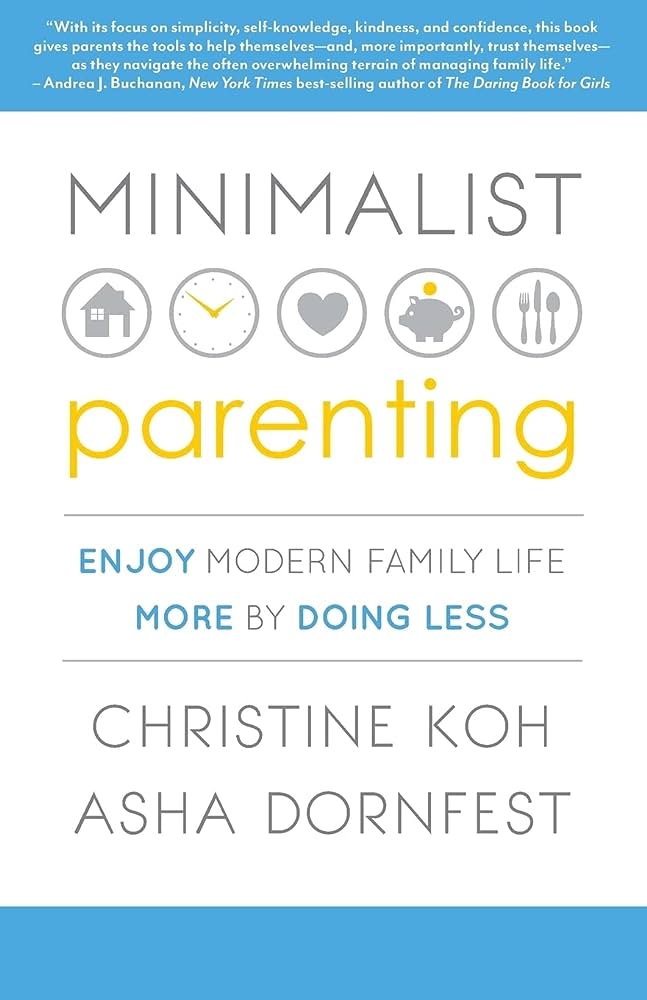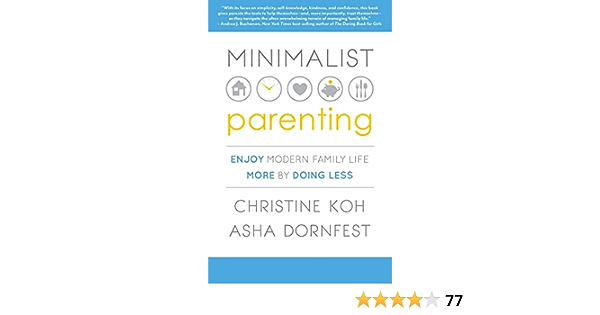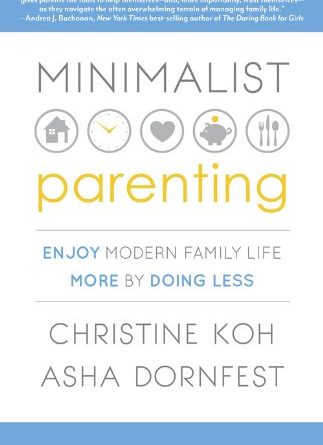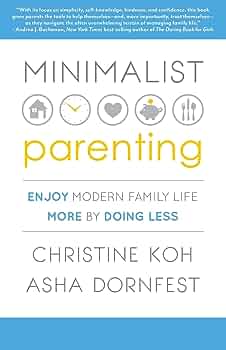
Minimalist parenting is a lifestyle choice that embraces the philosophy of intentional living, simplicity, and mindfulness in raising children. It encourages parents to prioritize what truly matters, such as quality time, meaningful experiences, and nurturing relationships, over the accumulation of material possessions. By focusing on essential needs and creating a clutter-free environment, minimalist parenting aims to reduce stress, enhance family connections, and promote a sense of calm and well-being for both parents and children. It is about fostering a balanced and purposeful approach to parenting that allows for more presence, joy, and fulfillment in family life.

Table of Contents
What is Minimalist Parenting?
Minimalist parenting is a lifestyle approach that focuses on simplifying and decluttering both physical and mental aspects of parenting. It is about embracing a more intentional and mindful approach to raising children, prioritizing quality over quantity, and instilling values of simplicity, gratitude, and sustainability. Minimalist parenting is not about deprivation or strict rules; rather, it is about consciously choosing what is essential and meaningful for your family’s well-being and happiness.
As a mother of three daughters and a firm believer in intentional living, I have personally experienced the benefits of minimalist parenting. The journey from a life burdened by excess and overwhelm to a life of purpose and joy has been profound. Minimalist parenting has allowed me to prioritize what truly matters and create a more peaceful and fulfilling family life.
By adhering to the principles of minimalist parenting, you can reduce stress and overwhelm, create more quality time with your children, improve focus and attention, and teach them the values of simplicity and gratitude. In this article, we will explore the essential principles of minimalist parenting, practical tips for implementation, its impact on child development, family finances, sustainability, and self-care. Let’s dive in!
Essential Principles of Minimalist Parenting
Focus on needs, not wants
One of the fundamental principles of minimalist parenting is shifting the focus from wants to needs. In today’s consumer-driven society, children are constantly bombarded with advertisements and the pressure to acquire more toys, gadgets, and clothing. Minimalist parenting encourages a more intentional approach to purchasing, ensuring that the items you bring into your home are truly necessary and serve a purpose.
Teaching your children to focus on their needs rather than their wants enables them to develop a sense of gratitude and contentment. By being intentional with purchases and setting limits, you can foster a mindset of appreciating and taking care of what they have rather than constantly seeking more.
Reduce clutter in the home
A cluttered and chaotic environment can contribute to stress and overwhelm for both parents and children. Minimalist parenting emphasizes the importance of decluttering and simplifying your living spaces. By removing excess belongings that no longer serve a purpose, you create a more peaceful and organized home.
Involving your children in the decluttering process can be a valuable opportunity to teach them about the importance of letting go and donating items to those in need. It also helps them develop good organizational habits and the ability to appreciate and take care of their possessions.
Simplify schedules and activities
In today’s fast-paced world, children are often overwhelmed with endless extracurricular activities and commitments. Minimalist parenting encourages simplifying schedules and prioritizing quality over quantity. Rather than filling every minute of your child’s day with multiple activities, focus on choosing a few meaningful and enriching activities that align with their interests and values.
Simplifying schedules not only reduces stress and burnout but also allows for more quality time together as a family. It creates space for unstructured play, downtime, and meaningful connections.
Practice mindful consumption
Mindful consumption is a key aspect of minimalist parenting. By being mindful of what we bring into our homes, we can make more ethical and sustainable choices. Consider the impact of your purchases on the environment and the well-being of others.
Encourage children to think about the lifecycle of products and the resources used to create them. Teach them about the importance of reusing, recycling, and buying secondhand when possible. By instilling these values, you are teaching them to be responsible global citizens who care about the world around them.
Tips for Implementing Minimalist Parenting
Decluttering and organizing
To start implementing minimalist parenting, begin by decluttering and organizing your home. Take it one room or area at a time, sorting through items and deciding what to keep, donate, or dispose of. Involve your children in the process by explaining the benefits of decluttering and helping them make decisions about their belongings.
Create designated spaces for each item to avoid clutter and make it easier to maintain an organized home. Teach your children the importance of putting things back in their designated place after use.
Creating a minimalist toy collection
Toys can quickly accumulate and become overwhelming for both children and parents. Create a minimalist toy collection by carefully selecting toys that promote open-ended play, creativity, and imagination. Quality over quantity is key.
Rotate toys regularly to keep them interesting and minimize clutter. Encourage your children to appreciate and take care of their toys, fostering a sense of gratitude and resourcefulness.
Establishing simple routines and schedules
Minimalist parenting emphasizes the importance of simplicity and routine. Establishing simple daily routines and schedules helps children feel secure and provides a sense of stability. Consistent bedtimes, meal times, and structured activities can reduce stress and help children feel more in control.
Keep routines flexible to allow for spontaneity and adaptability. Strive for balance, allowing time for both structured activities and free play.
Limiting extracurricular activities
While extracurricular activities can be enriching, it is important not to overwhelm your child with too many commitments. Consider your child’s interests and abilities, and choose activities that align with their passions. Limit the number of activities to avoid burnout and create more time for family bonding.
Encourage your child to communicate their desires and preferences when it comes to extracurricular activities. This fosters a sense of autonomy and ensures that the chosen activities are truly meaningful to them.
Minimalist Parenting and Child Development
Encouraging independent play
Minimalist parenting promotes independent play, which allows children to develop creativity, problem-solving skills, and self-reliance. Provide open-ended toys and materials that encourage imagination and self-expression. Set aside designated play spaces where children can explore and create on their own.
Resist the urge to constantly entertain your child and allow them to engage in independent play. This fosters a sense of independence and self-sufficiency as they learn to entertain themselves without relying on constant external stimulation.
Promoting creativity and imagination
By focusing on quality toys and experiences, minimalist parenting encourages children to engage in imaginative play. Create an environment that stimulates creativity, with art supplies, books, and natural materials. Limiting screen time and electronic devices allows space for children to engage in imaginative play and develop their own stories and worlds.
Encourage children to pursue their interests, whether it’s through art, music, or outdoor exploration. Provide them with opportunities to express themselves and develop their unique talents and passions.
Developing essential life skills
Minimalist parenting places value on teaching children essential life skills rather than focusing solely on academic achievements. By involving children in age-appropriate tasks such as cooking, cleaning, and organizing, they develop practical skills and a sense of responsibility.
Let children take on age-appropriate household chores, gradually increasing their responsibilities over time. This instills a sense of ownership and contributes to a well-functioning household where everyone plays a part.
Building strong parent-child relationships
Minimalist parenting creates opportunities for meaningful parent-child connections by prioritizing quality time together. By simplifying schedules and activities, you have more time to engage in activities that foster bonding and create lasting memories.
Take advantage of family meal times, shared hobbies, and outings to strengthen your relationship with your child. Put away distractions and be present during these moments, truly listening and engaging with your child.

Minimalism and Family Finances
Reducing expenses
Minimalist parenting can have a positive impact on family finances. By adopting a more intentional approach to purchasing, you can reduce unnecessary expenses and make wiser financial decisions. Prioritize needs over wants and carefully consider the value and longevity of items before making a purchase.
Consider implementing a “one in, one out” rule, where for every new item brought into the home, one item is donated or discarded. This helps maintain a clutter-free environment while also promoting mindful consumption.
Teaching children financial responsibility
Minimalist parenting provides an opportunity to teach children about financial responsibility from an early age. Involve them in budgeting and decision-making when it comes to family purchases. Talk openly about money and the importance of saving and making conscious choices.
Encourage children to save money for something they really want, teaching them the value of delayed gratification. Teach them about the importance of giving back and supporting causes they care about through donations or volunteering.
Prioritizing experiences over material possessions
Minimalist parenting encourages prioritizing experiences and creating meaningful memories over accumulating material possessions. Instead of focusing on buying the latest gadgets or designer clothing, invest in experiences that provide quality time and create lasting memories.
Engage in activities such as hiking, camping, visiting museums, or volunteering together as a family. These experiences not only enrich your child’s life but also instill values of gratitude, empathy, and connection.
Saving for the future
By adopting a minimalist lifestyle, you can save money not only in the present but also for the future. Through mindful consumption and reduced expenses, you can allocate more resources towards saving for education, emergencies, or long-term goals.
Involve your children in the saving process, teaching them about the importance of setting financial goals and saving for the future. By instilling these habits early on, you are equipping them with valuable financial skills that will serve them well throughout their lives.
Challenges of Minimalist Parenting
Dealing with societal pressures
One of the challenges of minimalist parenting is navigating societal pressures and expectations. In a culture that often equates material possessions with success and happiness, choosing a minimalist lifestyle may be met with skepticism or misunderstanding. It is important to stay true to your values and communicate the benefits of minimalist parenting to those who may not understand.
Remember that minimalism is a personal choice, and what works for one family may not work for another. Embrace your unique journey and focus on the positive impact it has on your family’s well-being.
Managing expectations of others
As a minimalist parent, you may face challenges when it comes to managing the expectations of family members, friends, or even your own children. Others may express their love through gift-giving or may not understand your decision to prioritize experiences over material possessions.
Openly communicate your values and intentions to those around you, explaining that your focus is on creating a more intentional and meaningful life for your family. Encourage alternative ways of showing love and appreciation that align with your minimalist lifestyle, such as spending quality time together or giving thoughtful, meaningful gifts.
Addressing potential conflicts with children
Children may resist the idea of decluttering or letting go of their belongings, especially if they are used to a more materialistic lifestyle. It is important to approach these conversations with empathy, understanding that it can be challenging for children to let go of sentimental items or toys they have grown attached to.
Involve children in the decision-making process and explain the benefits of decluttering, creating a more organized and peaceful home. Focus on the joy that comes from sharing and donating items to those in need. Gradually introduce the concept of minimalist parenting, allowing children to adjust at their own pace.
Balancing minimalism with sentimental items
One of the challenges of minimalist parenting is finding a balance between living a clutter-free life and preserving sentimental items that hold emotional value. It can be difficult to part with items that have sentimental meaning, such as artwork created by your child or heirlooms passed down through generations.
Find creative solutions, such as digitizing sentimental items, taking photographs, or creating memory boxes that can be stored in a designated space. By prioritizing the most meaningful sentimental items, you can minimize clutter while still preserving cherished memories.

Minimalist Parenting and Sustainability
Reducing waste and consumption
Minimalist parenting aligns with the principles of sustainability by reducing waste and consumption. By being mindful of what we bring into our homes and choosing durable, eco-friendly products, we can minimize our environmental footprint.
Encourage children to practice recycling, reusing, and reducing waste in their daily lives. Teach them about the importance of conserving resources and making conscious choices that have a positive impact on the planet.
Choosing eco-friendly and ethical products
Minimalist parenting promotes choosing products that are environmentally friendly and ethically produced. Opt for sustainable materials, such as organic cotton or bamboo, when purchasing clothing, bedding, or toys for your children. Support brands and companies that prioritize fair labor practices and minimize their environmental impact.
Involve your children in the shopping process, teaching them about the importance of ethical choices and responsible consumption. Encourage them to ask questions about where products come from and how they are made.
Teaching children about environmental responsibility
Minimalist parenting provides an opportunity to teach children about their role in preserving and protecting the environment. Engage them in activities such as gardening, composting, or participating in local environmental initiatives. Teach them about the importance of conserving water and energy and reducing waste.
Encourage children to connect with nature and develop a deeper appreciation for the natural world. Spend time outdoors, go on nature walks, and educate them about the importance of biodiversity and the impact of human activities on the environment.
Creating a greener future for generations to come
By adopting a minimalist lifestyle and teaching children about sustainability, you are contributing to creating a greener future for generations to come. Instill in them a sense of responsibility and empower them to take action to protect the environment.
Encourage discussions about climate change, resource depletion, and the importance of making conscious choices as consumers. By educating and inspiring your children, you are equipping them with the tools to become advocates for a more sustainable and environmentally conscious world.
Minimalist Parenting in the Digital Age
Managing screen time
In today’s digital age, managing screen time is an important aspect of minimalist parenting. Excessive screen time can negatively impact children’s physical and mental well-being, as well as hinder their development of important life skills.
Set limits on screen time and establish technology-free zones or periods in your home. Encourage alternative activities, such as reading, outdoor play, or engaging in creative projects. Be a role model by minimizing your own screen time and engaging in meaningful interactions with your children.
Balancing technology use with real-life experiences
While technology can offer educational and entertainment opportunities, it is crucial to strike a balance between technology use and real-life experiences. Minimalist parenting emphasizes the value of face-to-face interactions and engaging in activities that promote creativity, imagination, and physical activity.
Encourage your child to engage in hobbies, spend time outdoors, and develop real-life skills. Foster their curiosity and encourage exploration of the world beyond screens. Create technology-free spaces or times where the focus is on quality interactions and offline experiences.
Encouraging mindful online interactions
When it comes to digital interactions, minimalist parenting emphasizes the importance of mindful and responsible behavior. Teach your child about digital etiquette, online privacy, and the impact of their words and actions online.
Encourage positive online interactions and guide them on safe and responsible technology use. Monitor their online activities and engage in open conversations about the potential dangers and benefits of the digital world.
Promoting digital detox and unplugging
Occasional digital detoxes can be beneficial for both children and parents. Designate specific periods or days where the family unplugs from technology and engages in screen-free activities.
Use the time to connect as a family, engage in meaningful conversations, pursue hobbies, or spend time in nature. Encourage reflection and mindfulness during these periods and reflect on the impact of technology on your well-being and relationships.

Minimalist Parenting and Self-Care
Prioritizing self-care as a parent
Minimalist parenting emphasizes the importance of self-care for parents. It is essential to prioritize your own well-being and recharge your batteries to be able to meet the demands of parenting.
Take time for self-care activities that bring you joy and rejuvenation. This can include activities such as exercise, meditation, reading, or pursuing hobbies. Engage in activities that nourish your mind, body, and soul, helping you maintain a healthy and positive mindset.
Creating personal space and time
Minimalist parenting recognizes the importance of creating personal space and time for each family member. Designate spaces within your home that are solely for relaxation, reflection, and recharging.
Encourage children to create their own personal spaces, whether it’s a cozy reading corner or a space for imaginative play. Prioritize quiet time and ensure that each family member has opportunities to unwind and have their alone time.
Setting boundaries and saying no
Minimalist parenting promotes setting boundaries and saying no when necessary. It is important to establish clear limits and communicate your needs to prevent burnout and ensure a healthy work-life balance.
Model healthy boundaries and teach your children about the importance of respecting personal space and time. Encourage open and honest communication, allowing each family member to express their needs and set boundaries that align with their well-being.
Cultivating mindfulness and inner peace
Mindfulness is a powerful tool in minimalist parenting. By cultivating mindfulness, you can become more present in your parenting journey, savoring moments and finding joy in simplicity.
Practice mindfulness exercises as a family, such as deep breathing or guided meditation, to cultivate a sense of calm and inner peace. Teach your children to appreciate the beauty in everyday moments and encourage gratitude for the little things in life.
Finding Support and Resources for Minimalist Parenting
Books and blogs on minimalist parenting
There are numerous books and blogs available that provide guidance and inspiration on minimalist parenting. These resources offer practical tips, personal stories, and insights to help you navigate the journey of intentional living.
Explore books such as “Simplicity Parenting” by Kim John Payne, “Minimalism for Families” by Zoë Kim, or “The More of Less” by Joshua Becker. These books provide valuable perspectives and strategies for implementing minimalist parenting principles in your own life.
Online communities and forums
Online communities and forums provide a supportive network of like-minded individuals who are on their own minimalist parenting journeys. Joining these communities allows you to connect with others, share experiences, and gain insights from different perspectives.
Search for online groups or forums focused on minimalist parenting, where you can ask questions, seek advice, and engage in meaningful discussions. These communities offer a space to share your challenges, successes, and ideas, fostering a sense of belonging and support.
Local minimalist parenting groups
In addition to online communities, local minimalist parenting groups offer the opportunity to connect with families in your community who share similar values. These groups often organize meetups, workshops, or play dates, providing a sense of community and support.
Reach out to local community centers, parenting groups, or even create your own group by organizing gatherings or events. Sharing experiences and building relationships with other minimalist parents can be enriching and inspiring.
Seeking guidance from minimalist experts
Minimalist parenting is a journey of constant learning and growth. Seek guidance from minimalist experts, such as professional organizers, parenting coaches, or sustainability experts, who can provide personalized support and advice.
Consider hiring a minimalist consultant or attending workshops and seminars to deepen your understanding of minimalist parenting principles. These experts can provide tailored strategies and insights to help you overcome challenges and make intentional choices.

Conclusion
Minimalist parenting offers a path to a more intentional, fulfilling, and sustainable family life. By focusing on needs over wants, reducing clutter, simplifying schedules, and practicing mindful consumption, you can create a more peaceful and meaningful environment for yourself and your children.
Embrace the benefits of minimalist parenting, such as less stress, more quality time with your children, improved focus, and teaching values of simplicity and gratitude. Overcome the challenges by managing societal pressures, expectations of others, and finding balance between minimalism and sentimental items.
Through minimalist parenting, you can foster your child’s development, strengthen family connections, improve your finances, promote sustainability, navigate the digital age mindfully, and prioritize self-care.
Remember that minimalist parenting is a personal journey, and it is important to adapt the principles to your own family’s needs and values. Embrace the support of online communities, local groups, and resources available to gain inspiration, guidance, and connection.
As you embark on your own transformative journey of minimalist parenting, may you find joy, peace, and fulfillment in creating a life that is not just lived, but truly cherished.







